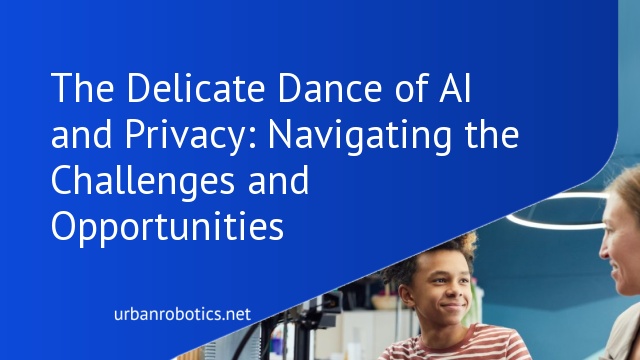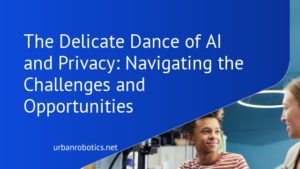Picture this: you’re scrolling through your favorite streaming service, and suddenly, a movie recommendation pops up that seems tailor-made for you. It’s almost as if the app has read your mind! Well, in a way, it has. This is the magic of artificial intelligence (AI) at work.
AI has become an integral part of our daily lives, seamlessly weaving itself into the fabric of our digital experiences. From predictive text on our smartphones to personalized shopping recommendations, AI is constantly learning from our behaviors and preferences to enhance our user experience.
But as we marvel at the convenience and efficiency that AI brings, we can’t help but wonder: at what cost? The rise of AI has sparked a heated debate about its impact on personal privacy. As we feed more and more of our personal data into these intelligent systems, we’re left questioning who has access to our information and how it’s being used. This article will go into potential AI privacy risks and what’s being done about it.
The Privacy Paradox: Balancing Innovation and Protection
The relationship between AI and privacy is a delicate dance. On one hand, we want to leverage the full potential of AI to revolutionize industries and improve our lives. But on the other hand, we can’t ignore the growing concerns about data privacy and security.
As AI algorithms become more sophisticated, they require vast amounts of personal data to learn and evolve. This data often includes sensitive information like our location, browsing history, and even our biometric data. While this data is crucial for AI systems to provide personalized experiences, it also raises red flags about potential misuse and breaches of privacy.
The challenge lies in finding the right balance between innovation and protection. We need to create a framework that allows AI to flourish while ensuring that our personal data remains secure and our privacy rights are upheld.
The Wild West of Data: Navigating the Regulatory Landscape
The rapid advancement of AI technology has left regulatory bodies scrambling to keep up. As the power of big tech companies grows, so does the urgency to establish clear guidelines and regulations around data privacy.
Efforts like the EU’s General Data Protection Regulation (GDPR) and the proposed AI Act are steps in the right direction. These regulations aim to give individuals more control over their personal data and hold companies accountable for their data practices.
However, the regulatory landscape is still a bit of a wild west. With different countries adopting different approaches to data privacy, it can be challenging for companies to navigate the complex web of regulations.
Empowering Users: Transparency, Control, and Awareness
One of the key ways to address privacy concerns in the age of AI is to empower users with transparency, control, and awareness. Companies need to be upfront about what data they’re collecting, how it’s being used, and who has access to it. Users should have the ability to opt-out of data collection and request the deletion of their personal information.
But transparency alone isn’t enough. We also need to educate users about their privacy rights and the potential risks associated with AI. By raising awareness and promoting digital literacy, we can help individuals make informed decisions about their personal data.
Designing for Privacy: Baking in Data Protection from the Start
As we continue to develop and deploy AI systems, it’s crucial that we prioritize privacy from the very beginning. This means incorporating privacy-by-design principles into the development process.
Instead of treating privacy as an afterthought, we need to bake it into the very foundation of AI systems. This includes implementing strong security measures, using encryption to protect sensitive data, and regularly auditing systems for potential vulnerabilities.
By making privacy a core tenet of AI design, we can create systems that are not only innovative but also responsible and trustworthy.
The Path Forward: Collaboration, Innovation, and Adaptation
Navigating the intersection of AI and privacy is no easy feat. It requires collaboration between policymakers, technologists, and privacy advocates. We need to foster open dialogue and work together to find solutions that balance the benefits of AI with the protection of personal privacy.
It also requires a commitment to ongoing innovation and adaptation. As AI technology continues to evolve, so too must our approaches to data privacy. We need to be proactive in identifying emerging threats and developing new tools and techniques to mitigate them.
The Future of Privacy in an AI-Driven World
As we look to the future, it’s clear that AI will play an increasingly important role in our lives. From healthcare to transportation to education, AI has the potential to transform virtually every industry.
But as we embrace this exciting new frontier, we must also remain vigilant in protecting our fundamental right to privacy. We need to work together to create a future where innovation and privacy can coexist harmoniously.
This means continuing to push for strong regulations, empowering users with transparency and control, and prioritizing privacy in the design of AI systems. It means fostering a culture of responsibility and accountability among companies that develop and deploy AI.
Above all, it means recognizing that privacy is not a luxury, but a necessity. In an age where our personal data is increasingly valuable and vulnerable, we must fight to protect it at all costs.
The Bottom Line
The intersection of AI and privacy is a complex and ever-evolving landscape. As we navigate this uncharted territory, we must remain committed to finding solutions that allow us to harness the power of AI while safeguarding our personal privacy.
It won’t be easy, but it’s a challenge we must embrace. Because ultimately, the future of privacy in an AI-driven world is up to us. We have the power to shape it, to demand accountability and transparency, and to ensure that our fundamental rights are protected.
So let’s roll up our sleeves and get to work. The delicate dance of AI and privacy may be challenging, but it’s a dance worth mastering. The future of our digital lives depends on it.





